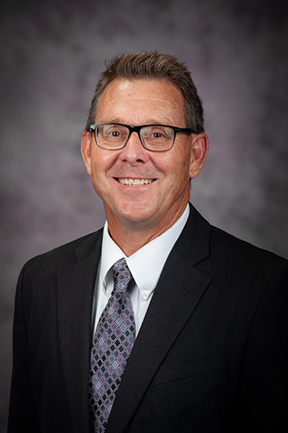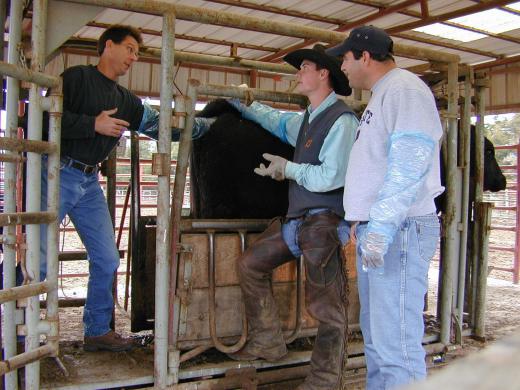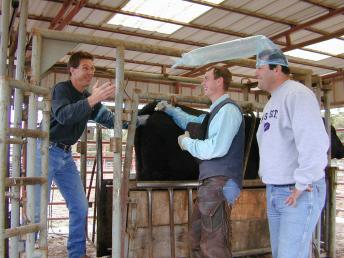Grieger, David

Professor
248 Weber Hall
Manhattan KS 66506
785-532-1229
785-532-7059 fax
dgrieger@ksu.edu
View My Curriculum Vitae (pdf)
Area(s) of Specialization
Beef Cattle Reproduction
Reproductive Molecular Biology
Publications
Education
B.S. , Purdue University, 1981
M.S. , Purdue University, 1984
Ph.D. , Washington State University, 1989
Post Doctoral Associate , Hospital for Sick Children, Toronto, Ontario, 1989 - 1992
Bio Brief

Dr. Grieger is a reproductive physiologist specializing in beef cattle and has been on faculty in the Department of Animal Sciences & Industry at K-State since 1992 (yes, a long time, and he hasn't been fired yet). Dr. G grew up in Leo, Indiana, a small town in the northeastern part of the state. He attended Purdue University and received his B.S. and M.S. degrees in Animal Science. He received his PhD in 1989 from Washington State University where he learned many things about the back end of the bovine.
A 3-year post-doctoral fellowship in Toronto, Ontario, perked his interest in molecular biology and the relationship between reproduction and genes (not jeans, although he has many). Since coming to K-State DrG has had primarily a teaching role in both reproduction and biotechnology. He has taught eight different courses over his tenure including applied courses such as Calving, Bovine Reproductive Technologies and Bovine Artificial Insemination (yes, Insemination, not Intelligence - although AI insemination technicians are quite intelligent).
 These classes include labs that involve estrous synchronization, reproductive ultrasonography and pregnancy diagnosis. He also teaches basic research-based classes such as Introduction to Animal Biotechnology, and Applied Animal Biotechnology.
These classes include labs that involve estrous synchronization, reproductive ultrasonography and pregnancy diagnosis. He also teaches basic research-based classes such as Introduction to Animal Biotechnology, and Applied Animal Biotechnology.
DrG has led international study tours to Central and South America and South Africa.
DrG’s research focus includes timed-insemination of beef heifers and cows, early embryo development and bull sperm longevity in the uterus.
Teaching

DrG’s teaching philosophy is to include experiential activities in lab sessions to compliment lecture content. ASI 512, Bovine Reproductive Technologies, is a "hands-in" course that includes lecture as well as labs where cattle work is done each week. Some students learn quicker than others, but by the end of the semester, they all know which end of the cow is important and where the sleeve goes.
For DrG’s biotechnology courses, lecture and lab content involves newer techniques and their application to farm animal production. Topics include semen sexing, in vitro fertilization, cloning and gene editing.
 DrG is also interested in the scholarship of teaching and investigating the best ways to engage students in a large classroom as well as the effectiveness of assessment through different types of testing.
DrG is also interested in the scholarship of teaching and investigating the best ways to engage students in a large classroom as well as the effectiveness of assessment through different types of testing.